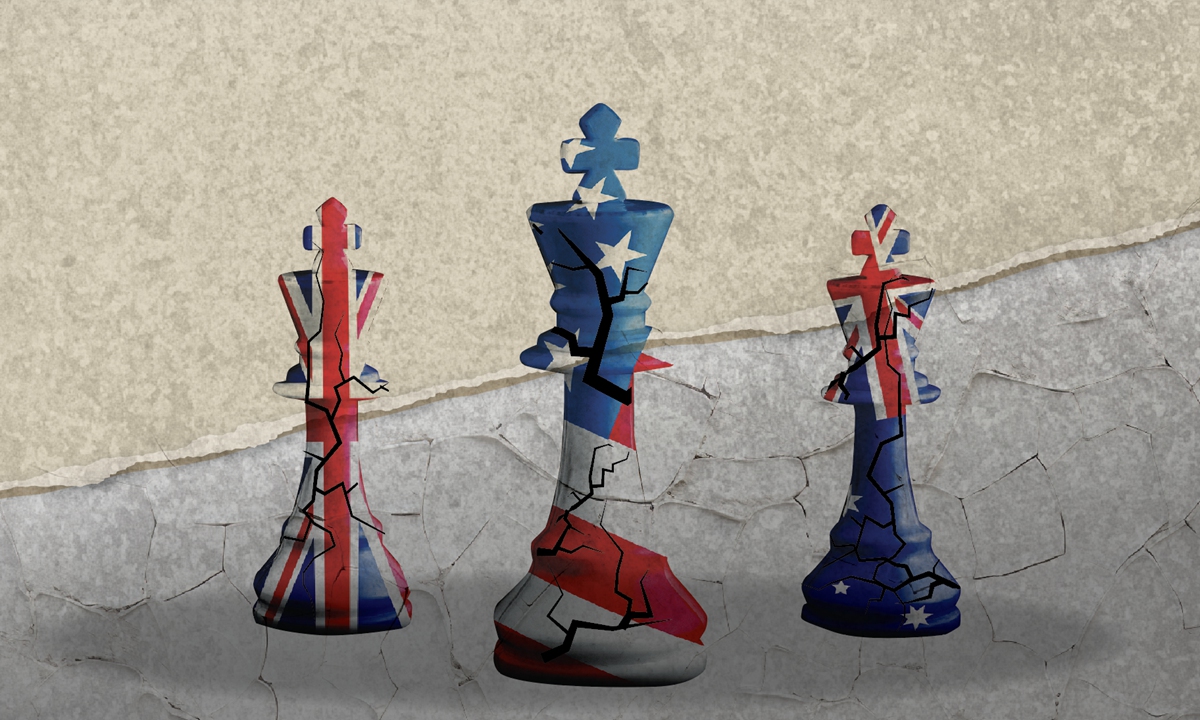Australia is likely to lose catastrophically if it goes to war with China: former Australian diplomat

Photo: VCG
Editor's Note:
Australia should "make it very clear to its American friends that we are not interested in joining a war against China in the South China Sea or the East China Sea over Taiwan," Dr Alison Broinowski (Broinowski) AM (Member of the Order of Australia), a member of Australians for War Powers Reform and former counselor with the Australian Mission to the UN, told Global Times (GT) reporter Li Aixin and Guo Yuandan in an exclusive interview. Broinowski shared her concerns about the viability of the AUKUS deal from technical and strategic perspectives, stressing that "we [Australians] live in this part of the world, the British and the Americans do not."

Alison Broinowski Photo: Courtesy of Broinowski
GT: In one of your articles, you quoted Hugh White, emeritus professor of Strategic Studies at the Australian National University, as stating that the AUKUS agreement is likely to "fail, perhaps acrimoniously." Why do you believe it will fail?
Broinowski: I'm speculating. Nobody knows for sure what is going to happen, partly because our government is telling us very little about what is happening.
There are lots of problems. If the problems get in the way of completing this agreement, then obviously, when I say acrimonious, I mean there are going to be serious differences between the three governments.
Professor Hugh White, who is a much better authority on defense and technology matters than I am, has listed all sorts of potential problems that can get in the way of this program, making it impossible to deliver properly.
For example, Australia has no nuclear industry. We would have to create one. We would have to create a technologically skilled workforce, which we don't have. We would have to create port facilities and we haven't, at this moment, even decided where they should be. There is going to be enormous civil dissatisfaction with having the port facilities right next to where people live.
There is no certainty about when all of this is going to be delivered, or exactly what is going to be delivered. When we first heard about this agreement from former prime minister Scott Morrison, we understood that we were going to build eight nuclear-powered submarines. Now, it's [going to be] a lot less.
I'd be perfectly happy for Australia to have no nuclear-powered submarines at all. And if we need to replace our existing submarines, let's do it with something more efficient, less expensive, more easily delivered and maintained, and crewed by Australians.
By the time they are delivered, if they are ever delivered, their usefulness will have disappeared, because by then the technology will be out of date. Anybody we hope to use them against will have left us behind by at least 20 years. It's very unlikely that people are going to be using submarines as weapons of war. There will be all kinds of robotic, subsurface technologies that are able to do all sorts of awful things that a submarine can't do. So we are really wasting an awful lot of time and money.
GT: In AUKUS, are the three governments pursuing the same goal?
Broinowski: I don't know what passed between them when they made the agreement, but every country acts in its own self-interest, particularly when it's talking to its allies.
The US is interested in maintaining its position as the global hegemon. The UK appears to want to revive its old, imperial stature by associating itself as closely as possible with the US. It hopes to be a global power by inserting NATO into this part of the world. It's a false hope. I don't think the UK is up to it economically, industrially or in any other way.
Australia, in my view, doesn't have an independent foreign or defense policy, not since before the federation in 1901. We have never had an independent foreign or defense policy. We have fought wars on behalf of our allies - the UK or the US - on the assumption, which turned out to be false in 1941, that they would defend us if we were in trouble.
It would make much more sense for us to be getting closer to countries that are forming the BRICS, or our ASEAN neighbors, and saying to them: We understand that the world has changed. We live in this part of the world, the British and the Americans do not. We need to be on the same side as the countries that are forming the new Global South. I'm not alone in this. There are many Australians trying to persuade our government about this.
GT: The US has begun talks with the UK and Australia on inviting Japan to collaborate on defense technology under the AUKUS security partnership. What do you think this could mean?
Broinowski: This isn't new. Australia has signed agreements with Japan and South Korea in the last couple of years about defense technology and cooperation. In both cases, they didn't want to alarm their regional neighbors about that. But it's all been done in a way that makes it look as if they've got technology that Australia needs, that they're prepared to share it and that we can work together.
This latest talk about Japan is just a slight move upward from that. These things are always done tiny step by tiny step. The current government in Japan would like very much to do a lot more in this regard. But it has its own population to deal with. It has its own commitment to not being a weaponized, militarized country, even though it has one of the biggest navies in the world.
What the US has been trying to do for years, is to get Japan slowly out (from constitution restriction) by contributing peacekeepers and so on, until it becomes acceptable to the Japanese people that Japan should go to war too. The Japanese people have long memories, and they don't want to go down that road again.
AUKUS Pillar Two has been put there for that very purpose: to bring countries that are hesitant about Pillar One, countries like South Korea, New Zealand and Japan, into the coalition. The US always loves a coalition. They've got to have a coalition - that's how they sell it to their congress to get the money to fund enormously expensive military operations.
Pillar Two looks at something that has a social and economic purpose, so that AUKUS does not look like just a military means to wage war. You will see Pillar Two develop and they will try hard to bring other countries into it.
GT: You mentioned that public opposition to AUKUS is spreading fast. Is public opposition having an impact on the progress of AUKUS development?
Broinowski: I don't think so, although the statistics I have from various careful surveys that have been done, particularly by the Lowy Institute, indicate that a large proportion of Australians are not in favor of the process with AUKUS. They are quite suspicious of it and don't feel as nearly as hostile to China as some of our ministers or some of our media appear to be. But the government shows no sign of pulling back from AUKUS.
I would be very surprised if, in this term of the US presidency, we'd hear anything further about Australia having doubts about AUKUS. What would create doubts about AUKUS would be a Donald Trump presidency in the US.
GT: What is Australia's policy on the South China Sea tensions? It seems to be drawing closer to the Philippines.
Broinowski: President Ferdinand Marcos Jr is being backed by the US in South China Sea affairs because it suits the US very much to have a spokesperson in the region and inside ASEAN.
The Philippines could find itself in a proxy war position. If the US decided that fighting for Taiwan island is not the way to go, then having the Philippines fight for the South China Sea would suit the US very well.
The point for Australia is that the South China Sea is as very much a matter of our trade routes to China as it is of China's trade routes to everywhere else, including Australia. Why would we want to suspend those trade routes by going to war in the South China Sea, at an enormous cost to ourselves and to everybody else? China depends on those sea lanes of communication as much as everybody else does.
In one way, the recent ASEAN-Australia Special Summit has achieved a good thing, because it's taken that kind of language out of the Joint Communique. (The ASEAN-Australia leaders' declaration removed any mention of Taiwan island and softened the language on the South China Sea.) It was there in the original Australian draft. Now, it is not there. The Malaysians, in particular, have pointed out that it's in their interest to get on with China as much as any other country in the region. That is precisely the kind of argument a lot of people in civil society in Australia are also making.
GT: You said, "A war against China would be catastrophic and we would lose it, with or without the US." What suggestions do you have for Australia to avoid a war or conflict?
Broinowski: Australia has, since 1945, been to several wars together with the US. And every single one of them has ended either badly, disastrously, or in a stalemate.
Given that the US couldn't prevail over the Taliban in Afghanistan, given that the US will not back Ukraine to the extent of being able to defeat Russia and given that it doesn't appear that the US has the moral fortitude to stop Israel doing what it's doing in Gaza, one really has to wonder about our alliance with the US and how much it can be relied upon to do anything, except what is in the US interest. It certainly won't go out on a limb to defend Australia.
Another war in this part of the world, in which either the US leads or it has a proxy to do the fighting, is very likely to end in the same way as all the others since 1951 (when Australia and the US became treaty allies). Anybody with any understanding of that possibility would be saying what the Australian government needs to do right now is make it very clear to its American friends that we are not interested in joining a war against China in the South China Sea or the East China Sea over Taiwan. That should be made very clear in advance.
We are likely to lose [such a war] and to lose it catastrophically, because the US can always go back to the other side of the Pacific. But Australia is always here.

